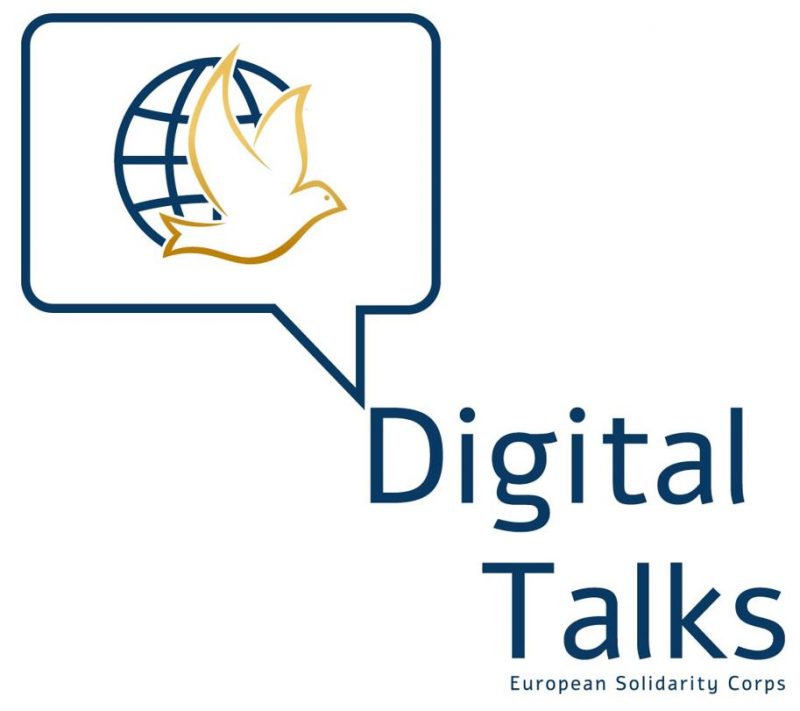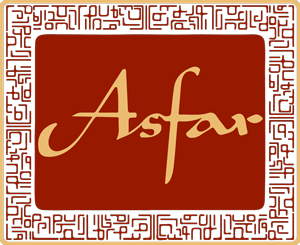Digital Talks
RESOLVE: Digital Talks was launched in March 2020 with the onset of the Coronavirus.

It was initially a micro-social action project established in partnership by the Asfar team, our current European Solidarity Corps volunteers and young people on our current Erasmus+ programmes.
Digital Talks involved two key deliver elements: youth-led peer Support & Mentoring, through ‘Digital Coffees’ and ongoing Skills and Knowledge linked to our current Erasmus+ programmes, even with lockdown, through educational ‘Digital Talks’.
The programme management team is a partnership including Asfar’s staff and the current youth wing of the RESOLVE: Network including our current European Solidarity Corps volunteers on the ESC Volunteer 4 Peace programme and encouraged co-development and youth-led social action and solidarity, key themes of our wider work.
It also ensured both support opportunities for young people in our network throughout the different countries, with the knowledge that if they really needed extra assistance then they could request a one to one call with a member of staff.
Eventually the micro-project received funding from the European Solidarity Corps.
The Digital Talks project, like all volunteer-led project eventually slowed down once the originally volunteers left the project.
However, if any volunteers are interested in re-launching it, Asfar will be here to support them and share our knowledge and learning from the project’s original lifetime.
Past Digital Talks – 2020-2022:
- ‘Introduction to Transitional Justice‘ by Louis Monroy-Santander, Faculty of Political Science and International Relations, Pontificia Universidad Javerianaa, Colombia
- ‘Conflict Resolution and the Spiritual Realm in post-conflict Mozambique‘ by Samara Dantas P. Guimarães, PhD in International Development, University of Birmingham, United Kingdom
- ‘Self-Planner: Goal Catcher training‘ by Teona Dalakishvili from the Creative Development Center, Georgia
- ‘Inter-ethnic Dialogue: the NDC’s 20-year engagement in Bosnia and Herzegovina‘ by Ljuljjeta Goranci Brkić from the Nansen Dialogue Centre, Bosnia and Herzegovina
- ‘Understanding conflict in the midst of urban riots in the USA‘ by Fabio Andrés Díaz, Researcher at the African Centre of Excellence for Inequalities Research (ACEIR), Research Associate at the Department of Political and International Studies at Rhodes University in South Africa and Researcher at the International Institute of Social Studies in the Netherlands
- ‘Eradicating Female Genital Mutilation (FGM) in Kenya‘ by Michael Deriaz, Board member from Friends of Kipkelion, United Kingdom
- ‘Peacebuilding in the context of COVID-19‘ by Amra Pandzo, from the Foundation Small Steps (Mali Koraci) and Kiruna Center for Peacebuilding, Bosnia and Herzegovina
- ‘RESOLVE: Concept‘ by Sheniz Tan, CEO at Asfar, United Kingdom
- ‘An interactive discussion on Sport for Development‘ by Jason McKoy from Mercurial Sports, United Kingdom
- ‘An introduction to the Youth Express Network‘ by Véronique Bertholle and Margaux Dos Santos from Youth Expres Network, France
- ‘Intimate Partner Violence (IPV)‘ by Rianna Raymond-Williams from Shine ALOUD, United Kingdom
- ‘Tackling Energy Poverty in Practice‘ by Tomislav Tkalec, Researcher at Focus Association for Sustainable Development, Slovenia
- ‘Youth Cooperation in the Western Balkans‘ by Berina Bukva, Regional Youth Cooperation Office (RYCO), Bosnia and Herzegovina
- ‘An introduction to long-term volunteering and the ESC‘ by Emina Hasanagić, Asfar, United Kingdom and current ESC Volunteers Luke Scott & Jade Sullivan (RESOLVE: Volunteer for Peace)
- Music Connects: How an inter-ethnic rock music program brings youth together in Europe’s most divided city by Wendy Hassler-Forest from Musicians Without Borders, The Netherlands.
- ‘Conflict Styles & Strategies’ by Majbritt Lyck-Bowen from the University of Winchester, UK
- ‘Desectarianisation: a New Path for Peace Building?‘ by Dr Simon Mabon from Lancaster University, United Kingdom
- ‘Rombelong Tutoring: Gypsy, Roma and Traveller people and education in the UK‘, by Chrissie Browne, Widening Participation Department at King’s College London.
- ‘Period Poverty in Sub-Saharan Africa’ by Modupe Adeagbo, a Public Health analyst from FemBox.
- ‘Moving Towards Sustainable Female Education’ by Ronke Oladele, Anchorise.
- ‘Closing the sex educational gap for girls in Bulgaria‘ by Svetla Raeva and Raya Baeva
- ‘The state of the art of resilience‘ by Jo Wilkie
- ‘The Refugee Experience: Humanitarian Migration in the UK’ by Far Mira Gerlach, Sarah M. Hughes and Aladdin Aljian.
- ‘Climate Change‘ by Dr Peter Hopcroft and Tamsin Lacourte.
- ‘An Israeli and an Iranian talk about nuclear weapons‘ by Emad Kiyae and Sharon Dolev.
- ‘Opportunities with Erasmus plus: An Introduction to the new Erasmus+ Programme Guide 2022’ by Emina Hasanagić and Bruno Pizzini.
- ‘Being a Team leader’ by Bruno Pizzini.
- ‘Why volunteer with Asfar?’ by Emma Ferraris and Jacob Allard.
- ‘Gender and Transitional Justice in Colombia’ by Louis Monroy-Sandander
- ‘Climate Change, Sustainability and NGOs’ by Emma Ferraris and Jacob Allard.
- ‘Ordinary Heroes, an educational peacebuilding program’ by Tatjana Milovanović and Benisa Bibuljica from PCRC
Recordings of our previoust Digital Talks can be found on Asfar’s Youtube channel: https://www.youtube.com/channel/UCX9OxG1owqAhsjUNVTHRHDg/videos
